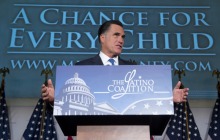Romney's Education Pseudo-Plan
Romney's Education Pseudo-Plan
The current national education reform plan is largely a foregone conclusion
; a coordinated and well-funded movement by legislators, business leaders, non profits, and billionaire philanthropists. As such, Obama has largely been able to claim the movement under his current education reform agenda. This leaves little room for his opposition to come up with new ideas that are going to get this large dollars interested. However, education reform has, since the passage of NCLB under George W. Bush, necessitated large-scale government intervention. On this, at least, Romney can claim some ground, making a “limited government” argument. Otherwise, however, Romney is advocating the same general talking points (with the same dubious results) as Obama.Romney’s plan, nostalgically titled “A Chance for Every Child”, is long on generalizations and lacks specifics. However, it advocates something very different in philosophy; a return to state and local control for education reforms. Couched within Romney’s plan for state government control is an emphasis in parent control and school choice, which is actually a provision of the nation education reform movement. Of course, Mitt Romney is a creature of the private sector, and anything he advocates will include increased privatization in service of reform; charter schools, voucher systems, and other programs that allow parents to remove their children from an underperforming school in favor of a better one. Of course, the greatest criticism of systems like these is the inevitable divide between high-performing (mostly white) schools, and low-performing (mostly minority) schools. Romney did not necessarily address this in his plan, and it will create a prominent weakness for opponents.
I can’t speak to whether Romney’s “A Chance For Every Student” plan is a political ploy to distance himself from Obama on education reform (and please his libertarian base) or a plan he’s actually pursuing as passable legislation should he be elected. However, the emphasis on increases in state and local control is an absolute necessity for public schools to improve. This is perhaps the only point upon which I would support Romney-lead policy; states and school systems must have the freedom to act in a child’s best interest. A public school, with its increased emphasis on serving children in need, and thus their communities, must have the power and the non-leveraged funding to do so. Anyone with the slightest understanding of what it is to be an educational professional in the classroom today will know that greater bureaucratic controls and external accountability are counter-productive to raising and educating children today.



